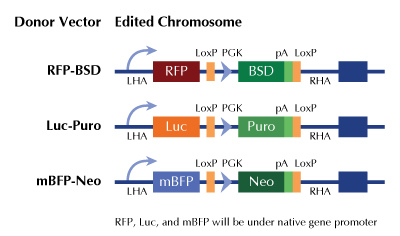LPHN1 (ADGRL1) Human Gene Knockout Kit (CRISPR)
CAT#: KN217296BN
LPHN1 - human gene knockout kit via CRISPR, HDR mediated
Functional Cassette: GFP-puro Luciferase-Puro RFP-BSD
HDR-mediated knockout kit validation
USD 1,657.00
4 Weeks*
Specifications
| Product Data | |
| Format | 2 gRNA vectors, 1 mBFP-Neo donor, 1 scramble control |
| Donor DNA | mBFP-Neo |
| Symbol | LPHN1 |
| Locus ID | 22859 |
| Components |
KN217296G1, LPHN1 gRNA vector 1 in pCas-Guide CRISPR vector KN217296G2, LPHN1 gRNA vector 2 in pCas-Guide CRISPR vector KN217296BND, donor DNA containing left and right homologous arms and mBFP-Neo functional cassette. GE100003, scramble sequence in pCas-Guide vector |
| Disclaimer | These products are manufactured and supplied by OriGene under license from ERS. The kit is designed based on the best knowledge of CRISPR technology. The system has been functionally validated for knocking-in the cassette downstream the native promoter. The efficiency of the knock-out varies due to the nature of the biology and the complexity of the experimental process. |
| Reference Data | |
| RefSeq | NM_001008701, NM_014921 |
| UniProt ID | O94910 |
| Synonyms | CIRL1; CL1; LEC2; LPHN1 |
| Summary | This gene encodes a member of the latrophilin subfamily of G-protein coupled receptors (GPCR). Latrophilins may function in both cell adhesion and signal transduction. In experiments with non-human species, endogenous proteolytic cleavage within a cysteine-rich GPS (G-protein-coupled-receptor proteolysis site) domain resulted in two subunits (a large extracellular N-terminal cell adhesion subunit and a subunit with substantial similarity to the secretin/calcitonin family of GPCRs) being non-covalently bound at the cell membrane. Latrophilin-1 has been shown to recruit the neurotoxin from black widow spider venom, alpha-latrotoxin, to the synapse plasma membrane. Alternative splicing results in multiple variants encoding distinct isoforms.[provided by RefSeq, Oct 2008] |
Documents
| Product Manuals |
| FAQs |
| SDS |
Resources
Other Versions
| SKU | Description | Size | Price |
|---|---|---|---|
| KN217296 | ADGRL1 - human gene knockout kit via CRISPR, HDR mediated |
USD 1,657.00 |
|
| KN217296LP | LPHN1 - human gene knockout kit via CRISPR, HDR mediated |
USD 1,657.00 |
|
| KN217296RB | LPHN1 - human gene knockout kit via CRISPR, HDR mediated |
USD 1,657.00 |
|
| KN417296 | ADGRL1 - KN2.0, Human gene knockout kit via CRISPR, non-homology mediated. |
USD 1,657.00 |
|
| GA107859 | ADGRL1 CRISPRa kit - CRISPR gene activation of human adhesion G protein-coupled receptor L1 |
USD 1,657.00 |
{0} Product Review(s)
Be the first one to submit a review






























































































































































































































































 Germany
Germany
 Japan
Japan
 United Kingdom
United Kingdom
 China
China
